#beherit is a better transliteration than behelit
Text
What Guts is for Griffith
a dispassionate analysis written for a better understanding of both characters and of Berserk
Part 4: Why Charlotte?
I have so many things to say about princess Charlotte. It would be easy to write her off as a secondary character, indispensable for the plot to advance: the woman who comes between Griffith and Casca, between Griffith and Guts, and the woman Griffith commits treason for sleeping with. But it is possible that Miura has given us something more about her that we dismiss because, let’s be real, we have a habit to dismiss characters that have an abundance of feminine traits, that are gentle and soft spoken and wear beautiful dresses. We criticize female characters more harshly, we certainly give more praise to the depiction of strong or competent women, or I should say, women that act like men, that show more masculine traits - but still offer to the view their pleasant feminine forms. That’s part of the generalized dismissal of feminine qualities as something secondary, ornamental and frivolous: contempt for the weak and disdain for women, femininity and non-standard expressions of sexuality and gender are traits of the culture of machismo still prevalent today. And I will talk about how Casca isn’t just that strong woman type either, but one thing at the time. So Charlotte first. Charlotte can be feminine, she doesn’t need physical strength and fighting abilities: as a princess, she has the privilege of being recognized as someone who matters already. What I appreciate are the subtleties and the details behind the cliches. And the cliches are there, she is a princess, she is to be a romantic interest: she stumbles and Griffith has to catch her, her horse is spooked and Griffith has to save her. But she isn’t the unassuming character that we see on the surface. Certainly sheltered and mostly innocent and not aware of the reality of the common people in Midland, Charlotte hasn’t been blind to the things that surround her. Midland has been involved in a hundred years' war that preoccupies the men around her, her father, her uncle the supreme general, and the talks of the nobility and the political machinations revolve around the war. She isn’t cheerful and carefree, she is asking questions about the purpose of that violence. When she is approached by Griffith at the hunt or at the Royal ball, she is initially somber and a little gloomy, bothered by the intrinsic violence of the hunt and by the fact that the ball and the festivities only try to “divert everyone’s attention in the castle even but a trifle from the weariness of the war”. In both cases, Griffith is the one who cheers her up for a while. And he paid attention to the questions she asked, bringing back the topic when they are alone. He has been thinking about what has been driving him to violence too, pondering about war and the senseless deaths of his soldiers: “Martyrdom for a merciless god. What a waste. On the battlefield, the life of a common soldier isn’t even worth a single piece of silver”.

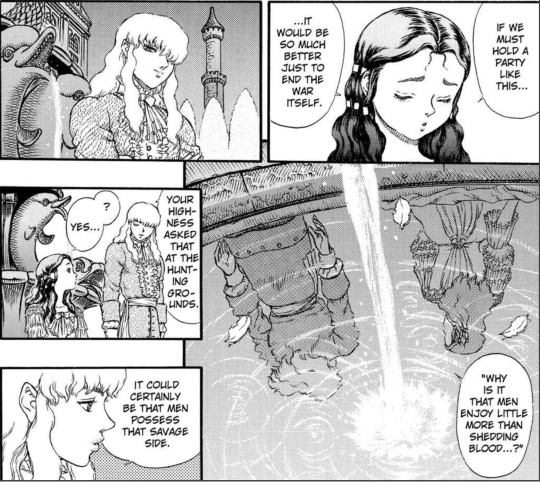
With Charlotte, like he tried to do with Guts, Griffith is able to talk openly about his thoughts. Griffith fits with the princess, he enjoys talking to her in those idealistic and philosophical terms, he has been educating himself not only to achieve his ambitions, but for pleasure also, he collected books and read extensively on things that aren’t all only useful to his goals. Those are things he can’t share with his soldiers and companions. He simultaneously has a burning need to reach the highest place in society in terms of power, and he strives for the betterment of his life and those lives and those deaths he cares about, those of the commoners who followed him in battle, those he is indebted to.
Griffith’s connection to Charlotte is surprising, he has paid attention to her behind what is in his interest only, behind the performance of the seduction. Once I understood it this way, it didn’t seem strange anymore then he went to her when he was wounded by Guts. Casca has been too emotionally dependent for Griffith to be able to weigh on her, or to seek her out when he needs support for himself. He feels too much that his role with Casca is to be the strong one, whenever she is trembling, because he feels responsible for her. If he falters, what would become of her? With Guts gone, Griffith only has Charlotte left.
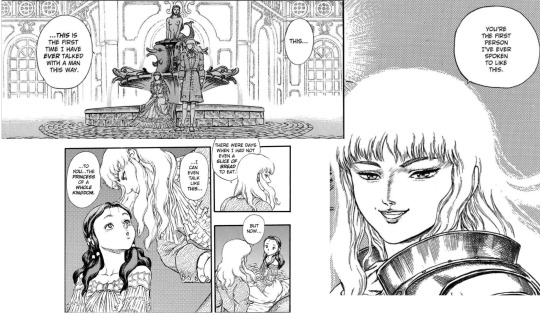
The Griffith who talks to Charlotte about dreams is the same Griffith who first talked to Guys about striving to know what is his place in the world: “That’s what I want to know! What is my place in the world? Who am I? What am I capable of? What am I destined for? It’s funny… you’re the first person I’ve ever spoken to like this”. Between Charlotte and Guts, the one who has been feeling intimidated is Guts. Charlotte accepts Griffith and makes some thoughtful observations about him: “Lord Griffith… you are a wondrous person. When I heard that you were common-born, it was very difficult to believe. Somehow… it is as if… you are nobler than any of the nobles in this castle (1). But, at the hunt when you taught me how to sound the reef whistle, you seemed very… simple and carefree (2). You were just like some village child used to playing in forests and rivers… and right now… you say the kinds of things a philosopher would say (3)”.
Charlotte doesn’t fall in love with Griffith because of how he looks or because of his heroic performances in the war, she is seeing him like maybe only Casca did, but she is also able to share with him the same sense of weariness and disdain for most of the nobles (1), the same innocent and childlike side (2) and the same interest to look at things like philosophers would do (3). It is this exchange with a person like Charlotte that brings along the discussion about friendship: “I imagine all of your friends, too… must have come so far with you, attracted by that charm”. Before speaking, Griffith’s looking down. Charm and charisma, he knows that those are the things that let him have a hold on people. But it has been bothering him, because that charm is also blinding others and keeping them from seeing the other characteristics of Griffith’s personality or his feelings. “They are… excellent troops. Together we have faced death so many times. They are my valuable comrades, devoting themselves to the dream I envision. …But… to me, a friend is… someone who would never depend upon another’s dream… Someone who wouldn’t be compelled by anyone, but would determine and pursue his own reason to live… And should anyone trample that dream, he would oppose him body and soul… even if the threat were me myself… What I think a friend is… is one… who is my equal”.
Even after listening to this, Casca is still determined to be a silent and strong presence at Griffith’s side, his “sword”, but she missed the implications of him saying “someone who would never depend upon another’s dream”, she says: “I want to be at his side. I want to be something he can’t do without in achieving his dream”. Regardless of his undoubted ambitions, Griffith feels that he has a duty to follow his dream for the sake of others, to give a meaning to the numerous deaths under his command, and to give a purpose and a sense of achievement to those who are still alive: “A man should envision such a lifetime once. A life spent as a martyr to the god named dream…” is the conclusion of a speech that started with: “For no other’s sake. To accomplish it for him… for himself. A dream”. It is a conclusion that is contradictory to his premise and reveals a disconnect between what Griffith is saying and what he is feeling. There is a thread of irrationality that is looming dangerously on him. He shoulders all the responsibility and the burden that comes with his ambitions and with war. A friend would look past Griffith’s charisma and his goals: “someone who wouldn’t be compelled by anyone, but would determine and pursue his own reason to live”.
Griffith’s desire to be challenged hides his need to find a compromise between following a dream that is too big for him, for a sense of duty and responsibility, and being himself, a confident young man who wanted to know what his place was in the world and wouldn’t accept to live his life passively, but doesn’t have that absolute conviction or lack of self doubt and insecurities.
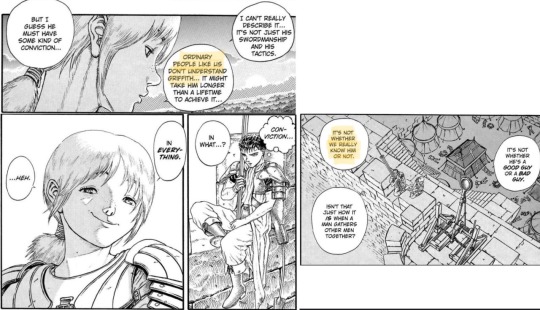
Guts is shattered by those words, because he never had the chance to think in those terms, having learned only how to survive the brutality of a mercenary life. Because he has been approaching his relationship with Griffith like he was with Gambino, Guts thinks that he has to gain attention, respect and affection, he has to prove that he meets some requirements. As a consequence of this conviction, he takes Griffith’s speech at face value, like a life lesson and mission. And he will be unable to look further, behind those words, to the times Griffith talked to him, acted recklessly for Guts’s sake, to all the signs that Griffith has relayed on Guts emotionally, the fond memories of their first duel that Griffith treasured, the soft spot that Guts occupies.
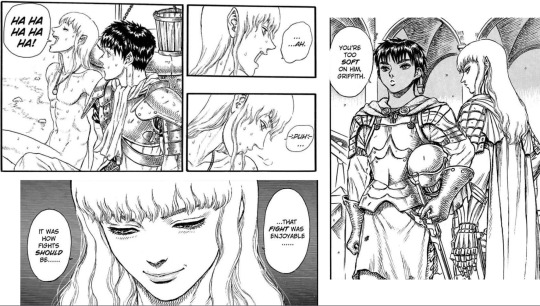
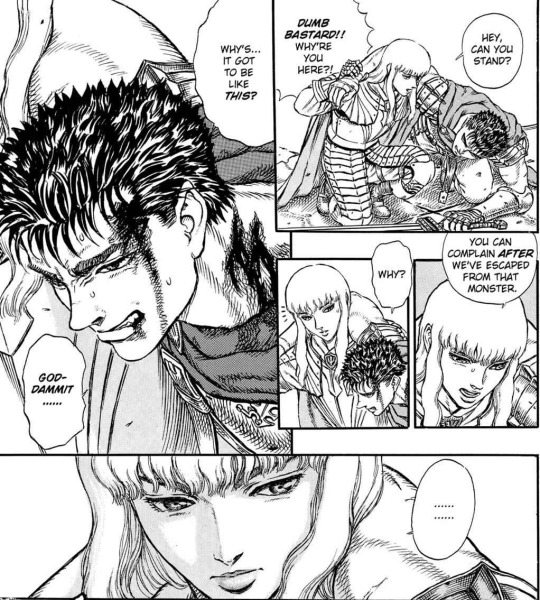
There is evidently a hard side to Griffith, he has been having success so far because of his confidence: “That is how I have achieved everything so far”. The sheer satisfaction he shows when he learns that Julius is dead and Adonis too is undisputable. Adonis’s death wasn’t part of the plan but it is extremely lucky in connection with the deepening of Griffith’s relationship with Charlotte, because Adonis was expected to marry her once he was older. That “luck”, those coincidences and incidents that continue to happen since the appearance of Zodd, arguably since Griffith acquired the beherit, are tied to an irrational force or to whatever causality that is pushing towards a certain direction, without none of our characters being the wiser. Griffith met Charlotte under those ambiguous auspices. But at the same time, Griffith really bonded with Charlotte, there is a sincerity to it. And there is sincerity and emotional depth in his personality, the darker traits intertwined with lighter and quite candid qualities. To become what the Godhand asks of him, he will need to be thrown into the deepest darkness and loneliness: “I’m sinking… farther from the light. Where?” And then: “The crystallization of your last tear shed. When suffering so profound as to make someone rip himself apart is confronted… a heart is frozen”.
More about Griffith and Charlotte on a later date.

#berserk#berserk manga#berserk meta#griffith#griffith x charlotte#guts berserk#beherit is a better transliteration than behelit#manga analysis#eri reads berserk#charlotte
66 notes
·
View notes